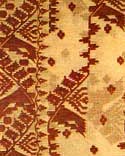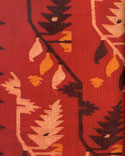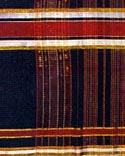|
| Home | A Journey into Modern Bangladesh | Textiles |
 | Textiles |  Of all hand-woven textiles none is more renowned in history than the closely woven Muslin of Bangladesh. Exceptional skill was required in the spinning and weaving of this fabric. The spinners were young women, between the ages of eighteen and thirty, after which their expertise was said to wane due to their failing eyesight. They belonged to a few families around Dhaka and had acquired their remarkable skill over generations. Of all hand-woven textiles none is more renowned in history than the closely woven Muslin of Bangladesh. Exceptional skill was required in the spinning and weaving of this fabric. The spinners were young women, between the ages of eighteen and thirty, after which their expertise was said to wane due to their failing eyesight. They belonged to a few families around Dhaka and had acquired their remarkable skill over generations.
Jamdani, the loom figured Muslin, has been called chef d’oeuvre of the weaver and because of its intricate pattern, it has always been the most expensive product of the Dhaka looms. Jamdani manufactured for the Moghul Emperor Aurangzeb in the seventeenth century cost over thirty pounds. To this day, the Jamdani weaver is deemed the finest weaver in South Asia.
|  The dominant feature of the Jamdani is its magnificent design, which is said to be of Persian origin. The method of weaving is akin to tapestry work in which small shuttles of coloured, gold or silver threads, are passed through the weft. Of classic beauty, the Jamdani effectively combines intricacy of design with muted or vibrant colours. The dominant feature of the Jamdani is its magnificent design, which is said to be of Persian origin. The method of weaving is akin to tapestry work in which small shuttles of coloured, gold or silver threads, are passed through the weft. Of classic beauty, the Jamdani effectively combines intricacy of design with muted or vibrant colours.
Some of the saris for which Bangladesh is also famous are the Dhaka Bhiti, Tangail Cotton, Silk Muslin and the Pabna saris. In these saris the emphasis is on rich warm colours, both vibrant and muted. The attention is on the Anchal and the border, which may be in alternate lines of contrasting shades with an interplay of small paisley, rosette and geometric designs. These saris are sometimes highlighted with lines of gold or silver thread, to add to their elegance.
|  By far the most renowned embroidery of Bangladesh is Nakshi Kantha, the embroidered quilt. It is an exquisite work of art where the basic material is thread and old cloth. As an artist uses his brushes and colours to paint his/her vision, the Kantha maker uses the needle and many-coloured thread to embroider hers. Each Kantha is unique, with the embroider taking pride in the exclusivity of her creation and thus reflects the woman’s ingenuity and richness of vision. By far the most renowned embroidery of Bangladesh is Nakshi Kantha, the embroidered quilt. It is an exquisite work of art where the basic material is thread and old cloth. As an artist uses his brushes and colours to paint his/her vision, the Kantha maker uses the needle and many-coloured thread to embroider hers. Each Kantha is unique, with the embroider taking pride in the exclusivity of her creation and thus reflects the woman’s ingenuity and richness of vision.
| |
|
|